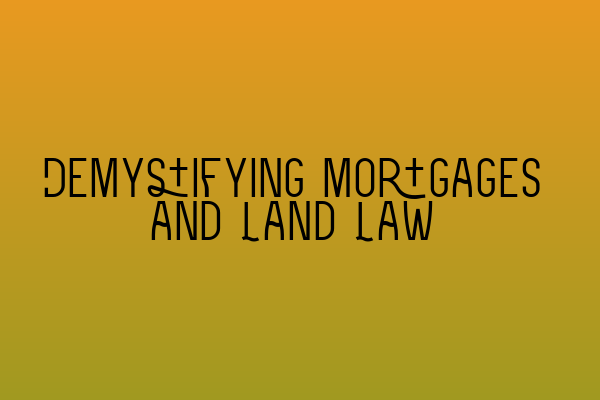Demystifying Mortgages and Land Law
Welcome to our blog post on mortgages and land law. In this article, we will delve into the world of property law and discuss the ins and outs of mortgages, helping you gain a better understanding of this complex area. Whether you are a homeowner, a potential buyer, or a legal professional, this article aims to provide valuable insights and guidance.
What is a Mortgage?
A mortgage is a legal agreement between a borrower and a lender in which the borrower receives a loan to purchase a property. The property serves as collateral for the loan, meaning that if the borrower defaults on their payments, the lender has the right to take possession of the property.
Understanding the terms and conditions of a mortgage is essential for both borrowers and lenders. As a borrower, it is important to clearly comprehend your obligations, rights, and financial implications. As a lender, having a firm grasp of the legal framework governing mortgages is crucial to protect your interests.
Types of Mortgages
There are several types of mortgages, each with its own features and benefits. The most common types include:
- Fixed-Rate Mortgages: These mortgages have a fixed interest rate for the entire loan term, providing borrowers with predictable monthly payments.
- Variable-Rate Mortgages: Also known as adjustable-rate mortgages, these loans have an interest rate that fluctuates based on the market conditions.
- Interest-Only Mortgages: With an interest-only mortgage, borrowers only have to pay the interest on the loan for a certain period, after which they must start repaying the principal.
- Buy-to-Let Mortgages: This type of mortgage is specifically designed for purchasing properties with the intention of renting them out.
Choosing the right type of mortgage depends on your individual circumstances and financial goals. It is advisable to seek professional advice to ensure you make an informed decision.
Land Law and Mortgages
Land law encompasses the legal principles and regulations governing the ownership, use, and transfer of property. When it comes to mortgages, understanding land law is crucial, as it determines the rights and responsibilities associated with property ownership and financing.
In land law, there are various legal concepts and processes involved in mortgage transactions:
- Equitable Mortgages: This type of mortgage arises when the borrower has an equitable interest in the property, but legal title remains with the seller or another party.
- Legal Mortgages: A legal mortgage is created when the borrower has both legal and equitable title to the property, providing greater security to the lender.
- Priority Rules: Priority rules determine the ranking of mortgage interests if multiple mortgages exist on the same property. Understanding these rules is crucial to protect your interests as a lender.
- Foreclosure: Foreclosure is the legal process through which a lender can take ownership of a property if the borrower defaults on the mortgage payments.
Having a solid understanding of land law is key to navigating mortgage transactions and ensuring legal compliance.
Conclusion
Understanding mortgages and land law is essential for all parties involved in property transactions. Whether you are a borrower, a lender, or a legal professional, having a firm grasp of the legal framework and processes associated with mortgages is crucial to making informed decisions and protecting your interests.
If you are preparing for the SQE exams or looking for comprehensive SQE preparation courses, we recommend checking out our related articles:
- SQE 1 Practice Exam Questions
- SQE 1 Practice Mocks FLK1 FLK2
- SQE 2 Preparation Courses
- SQE 1 Preparation Courses
- SRA SQE Exam Dates
We hope this article has shed some light on the often-mystifying world of mortgages and land law. If you have any further questions or require legal assistance, please feel free to contact our team at SQE Property Law & Land Law. We are here to help!
